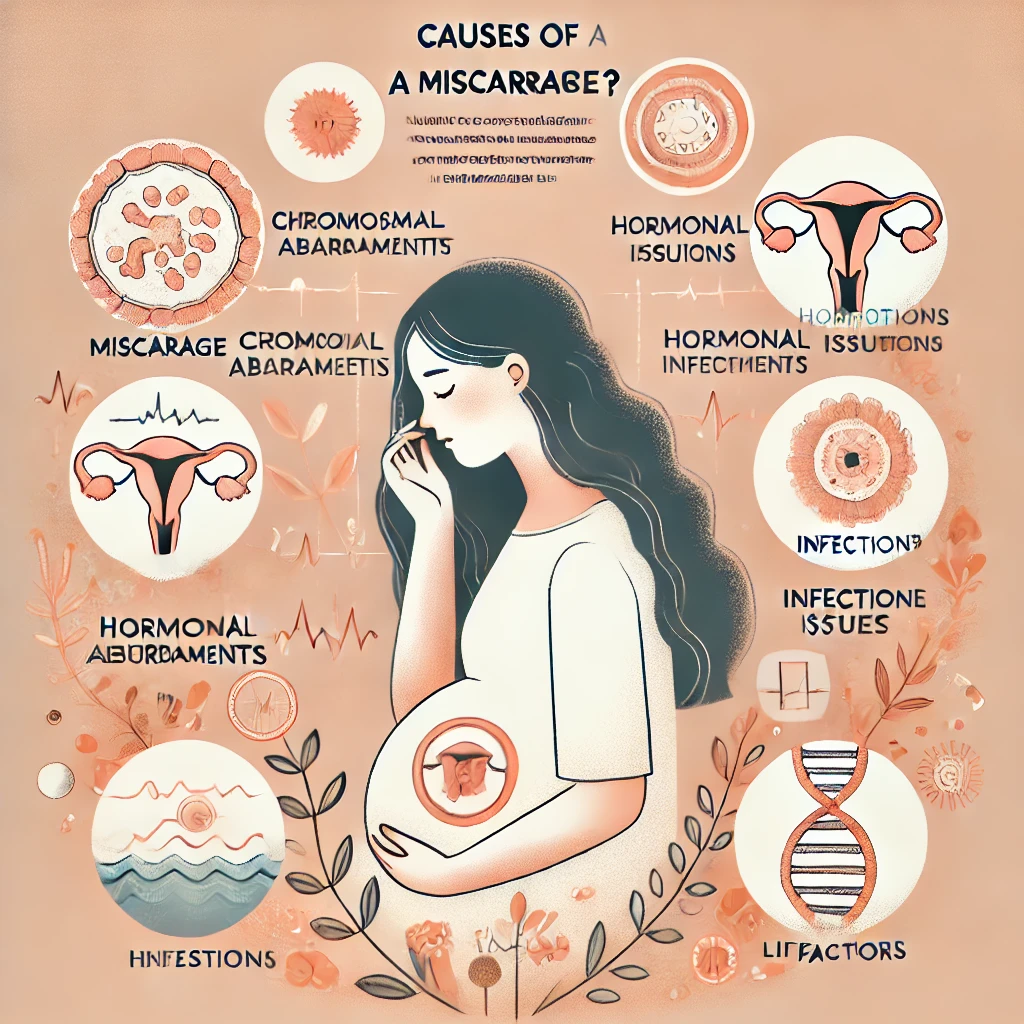We believe it is important to share reliable information about all aspects of pregnancy and birth. A topic that is often underexposed but very common is miscarriage. If you have experienced one yourself or know someone who has, you know how difficult and disruptive it can be. We hope that this information offers you support and insight during a difficult time. Let's look together at what a miscarriage exactly entails, what causes it and how you can take care of yourself after such a loss.
What is a miscarriage

Symptoms of a miscarriage
Symptoms vary from person to person, but the most common signs include:
-
- Cramps
-
- Bleeding
-
- Pain in the lower back
Recognizing these symptoms can help you seek medical attention in a timely manner. Our team at Verloskundigen PuurBegin is always here to support and guide you. Our mission is to help you understand what's happening and how to best care for yourself.
What does bleeding in early pregnancy mean?
Experiencing bleeding in the early stages of pregnancy can be frightening, but it is not always a sign of a miscarriage. There are several causes of bleeding and not all of them lead to a bad outcome. Often, bleeding is caused by things like implantation bleeding, which occur when the fertilized egg attaches to the uterine wall. This is a completely normal process that usually occurs around the same time as your period. This can be confusing, but is generally not a cause for concern.
Sometimes blood loss can also be caused by hormonal changes or a sensitive cervix. During pregnancy, your hormone levels can fluctuate, sometimes causing some bleeding. Your cervix may also be more sensitive due to the increased blood flow, which can cause light bleeding after intercourse, for example. While it’s important to always contact your midwife for advice, there are some common causes of bleeding that don’t necessarily warrant immediate panic:
-
- Implantation bleeding
-
- Hormonal changes
-
- Tender cervix
| Cause | Duration | What to do? |
|---|---|---|
| Implantation bleeding | 1-2 days | Check, but stay calm |
| Hormonal changes | Every now and then | Consultation with midwife |
| Tender cervix | Variable | If in doubt, consult |
What are the causes of a miscarriage?

-
- Infections, such as rubella or cytomegalovirus.
-
- Chronic diseases, such as diabetes or thyroid disorders.
-
- Lifestyle factors, such as smoking, alcohol use or drug use.
-
- External factors, such as exposure to harmful substances.
To provide an overview of some common causes and possible solutions, we have put together a table for you below:
| Cause | Possible Solutions |
|---|---|
| Genetic abnormalities | Genetic counseling |
| Chronic diseases | Medical treatment |
| Lifestyle factors | Healthier living |
| Infections | Medication and vaccination |
Symptoms of a miscarriage
Miscarriage can cause many different physical and emotional symptoms. It is essential to recognize these symptoms early so that you can receive the right care. Common signs include:
-
- Vaginal bleeding, ranging from light to heavy
-
- Cramping abdominal pain that feels like menstrual cramps
-
- Loss of pregnancy symptoms such as nausea and tenderness in the breasts
In addition to these physical signs, there are also emotional symptoms that often occur. Experiencing a miscarriage can cause a lot of stress and sadness. It is completely normal to grieve and to have feelings of guilt or anger. That is why we at Verloskundigen PuurBegin always offer emotional support. If you need practical tips for dealing with these feelings, please check out our tools and resources that have been developed especially for you.
Blood loss
-
- Colour: The blood can range from light pink to dark brown.
-
- Frequency: It can come continuously or in peaks.
-
- Intensity: From light spotting to menstrual-like bleeding.
At first glance, it can be difficult to judge for yourself. That is why it is always wise to consult a specialist in case of any form of bleeding. Here is a brief overview of possible causes and their characteristics:
| Cause | Characteristics |
|---|---|
| Innocent bleeding | Light, no painful cramps |
| Miscarriage | More severe, often with cramps |
| Infection | Additional symptoms such as fever |
What is the chance of a miscarriage?
Miscarriages are more common than you might think. The risk of miscarriage varies from pregnancy to pregnancy, but in general, about 10-20% of confirmed pregnancies end in miscarriage. This is usually due to genetic abnormalities or other health issues that affect the embryo during early development. It's important to realize that many women experience miscarriage and that you are definitely not alone. Here are some factors that can increase your risk of miscarriage:
-
- Maternal age (over 35 years)
-
- A history of previous miscarriages
-
- Underlying health conditions (e.g. diabetes or thyroid disorders)
-
- Unhealthy lifestyle (smoking, alcohol consumption)
| Factor | Chance increase |
|---|---|
| Age over 35 years | Increased risk |
| 2 or more previous miscarriages | Significantly higher |
| Smoking | Up to 25% more chance |
While the risk of miscarriage is real, there is good news: most women who miscarry go on to have successful pregnancies. Maintaining a healthy lifestyle and receiving regular medical care can increase your chances of a healthy pregnancy. Our midwives at Verloskundigen PuurBegin are here to help you through these challenging times and provide you with the best care and support.
What is the chance of miscarriage per age group?
The risk of miscarriage varies significantly by age group. Research shows that women under the age of 35 have an approximately 15% chance of having a miscarriage. This percentage gradually increases with age. When a woman is between the ages of 35 and 39, the risk increases to around 20-25%. For women aged 40 and over, the risk is even higher, at around 35-40%. It is important to understand that these figures are averages and that individual factors such as health, lifestyle, and genetics also play a role. Therefore, it is always advisable to consult with a medical professional for a personalized advice.
-
- Younger than 35 years: 15%
-
- 35-39 years: 20-25%
-
- 40 years and older: 35-40%
At Verloskundigen PuurBegin we are here to support and inform you throughout your pregnancy, even if it ends in a miscarriage. We believe it is important to help you understand and process these emotional experiences. We encourage you to be open about your concerns and questions; our team is ready with expert advice and a listening ear. In the event of a miscarriage, we will contact you several times as standard, so that you do not have to do it all alone. Because we know how important it is to be well informed, we keep you up to date with the latest research and advice, so that you can always make the best choices.
What to do in case of a miscarriage?
If you are experiencing a miscarriage, it is essential to know what steps you can take. It is understandable that you may have questions or concerns. Here are some important things to keep in mind to help you through this difficult time:
-
- Seek immediate medical attention: Please contact us as your midwife for advice.
-
- Support from loved ones: Talk to your partner, friends and family about what you are going through.
-
- Rest and recovery: Give yourself time to recover both physically and emotionally. Get enough rest and sleep.
Here at Midwives PuurBegin, we understand how difficult this experience can be. To help you better prepare, we have listed some practical steps:
| Step | Description |
|---|---|
| Medical aftercare | Make an appointment for a check-up with us as your midwife. |
| Emotional support | Consider talking to a therapist, a miscarriage can have a big emotional impact |
| Next steps | If necessary, plan future pregnancies with us so that you are well informed before you become pregnant again. |
Ultrasound examination
-
- Heartbeat confirmation: Check that the heart is beating as expected.
-
- Fetal growth: Whether the baby is developing at the correct term.
-
- Placenta location: To see if it is in a safe place.
-
- Amniotic fluid: The amount of amniotic fluid surrounding the baby.
Because we understand that waiting can be stressful, you will receive the results immediately after the ultrasound. If the results are not good, we will contact you as soon as possible to hear how you are doing and to be there for you.
Wait until the miscarriage occurs spontaneously
When you have been told during the ultrasound that you have unfortunately had a miscarriage, all kinds of things go through your mind. The first questions are often how this could have happened, what could have been the cause and then usually the question arises: what now? We understand that you have many questions and that is why we will also contact you several times in the event of a miscarriage. We will discuss whether you want to wait until the miscarriage starts on its own (wait until the bleeding starts, if you have not already). During this time, the symptoms can vary from light bleeding and cramps to heavier bleeding and severe abdominal pain. Although this process can be emotionally difficult, for some women it feels more natural than medical interventions. That is why it is important to be thoroughly informed and to stay in good contact with your midwife.
In addition, there are some important tips to keep in mind while waiting:
-
- Listen to your body and give yourself the space to rest.
-
- Make sure you have a supportive network of friends and family around you.
-
- Keep a journal to record your emotions and physical well-being.
-
- Contact your midwife if you experience extreme pain or notice abnormal bleeding.
Together with us as your midwife, you can make the best decisions for your situation. If there are complications, medical treatment can still be discussed. This is, for example, when you develop a fever or if you continue to have long-term blood loss and the abdominal pain is not under control with pain relief.
What happens during a spontaneous miscarriage?
A spontaneous miscarriage can be emotionally and physically demanding. The process usually starts with light bleeding, which gradually becomes heavier. Women may also experience cramping or abdominal pain, similar to menstrual cramps but sometimes much more intense. Over time, the body will expel the pregnancy tissue. In most cases, this process takes a few days to a few weeks. However, some women need additional medical support to complete the process, such as medication or a minor surgical procedure known as curettage.
It is important to know what to expect during a spontaneous miscarriage:
-
- Bleeding: This can range from light spotting to heavy bleeding.
-
- Cramps: Usually intense, referred to normal menstruation.
-
- Emotional impact: It can be stressful and sad.
| Symptom | Description |
|---|---|
| Light bleeding | Spotting, similar to normal menstruation |
| Heavy bleeding | More intense than a regular period |
| Stomach cramps | Menstrual-like pain, but often stronger |
Midwives PuurBegin recommend that you contact your midwife if you have any questions or need additional support during this sad process.
What is the chance of a complete miscarriage?
At Verloskundigen PuurBegin we know that every pregnancy is unique. However, there are some common factors and numbers surrounding miscarriage that many women want to know. The chance of a complete miscarriage varies greatly depending on a number of different circumstances. For example, approximately 80% of miscarriages occur in the first trimester, often before the woman even knows she is pregnant. This can be particularly distressing, but it may help to know that most miscarriages are due to natural causes.
There are some risks that can increase your chance of miscarriage, but it doesn't mean you can't do anything. Here are some factors that can play a role:
-
- Age: Women over 35 have a slightly higher chance of miscarriage.
-
- Lifestyle: Smoking, alcohol use and being overweight can increase risks.
-
- Health: Chronic conditions such as diabetes or thyroid problems can have an impact.
We understand that this can be sensitive, which is why we provide extensive support and information. See below for some statistics that may help you:
| Factors | Chance of miscarriage |
|---|---|
| Age 20-35 | 15% |
| Age 35-39 | 20 – 25% |
| Age 40+ | 35 – 40% |
By being aware of these factors and taking active steps, you can reduce some of the risk. Stay in touch with your midwife for personal advice and guidance.
What are the risks and complications?
Miscarriage can come with several risks and complications. First of all, there are physical symptoms, such as heavy bleeding, cramps, and infections. Sometimes medical intervention is needed to remove residual material from the uterus, which can lead to scarring. In addition to the physical consequences, the emotional impact is also significant. Women can experience feelings of sadness, guilt, and even anger, which affects their daily lives and relationships. For this reason, it is essential to provide not only medical, but also emotional support.
Although most miscarriages pass without long-term complications, there are situations where extra care is needed. This may include:
-
- Recurrent miscarriages: When a woman has had three or more miscarriages in a row.
-
- Infection: If fever and severe pain occur, there may be an infection, for which antibiotics are required.
| Complication | Symptoms |
|---|---|
| Heavy bleeding | Dizzy, feeling weak |
| Infection | Fever, severe pain |
Our midwives at Verloskundigen PuurBegin are always ready to help you through this difficult time. Whether you need physical or emotional support, we offer a listening ear and the necessary advice to move forward.
Additionally, there are several medical options to consider, depending on how your body is coping with the miscarriage. Some people choose to let it progress naturally, while others consider medications or a procedure like a curettage. Here’s a quick comparison:
| Option | Advantages | Cons |
|---|---|---|
| Natural progression | – Less drastic – Follow natural process |
– May take longer – Emotionally heavy |
| Medication | – Speeds up the process – Home treatment |
– Possible side effects – Can be painful |
| Curettage | – Quick fix – Under medical supervision |
– Surgical intervention – Recovery period required |
Whether you choose natural waiting, medication, or surgery, make sure you choose the option that feels right for you and your body. Take the time to consider your options and discuss them with your midwife; they are there to support you.
What pain relief during a miscarriage?
| Medicine | Advantages | Cons |
|---|---|---|
| Paracetamol | safe, effective | no anti-inflammatory effect |
| Ibuprofen | reduces inflammation | may cause stomach upset |
| Acupuncture | Naturally | expensive, time consuming |
Medicines to speed up miscarriage
In the event of a miscarriage, it may sometimes be necessary to speed up the natural process to reduce physical and emotional stress. There are several medications available that can help with this. Misoprostol is one of the most prescribed medications. It helps the uterus to contract, which makes the miscarriage happen faster. This medication is often inserted vaginally for best effect. The use of medications to speed up a miscarriage should always be done in consultation with your midwife or doctor.
In addition, there are some things you should keep in mind when using these medications:
-
- The possibility of side effects such as cramps, nausea, and heavy bleeding.
-
- Time: It may take several hours to days for the medicine to take effect.
-
- After using the medication, a follow-up appointment with the midwife is necessary to verify that the miscarriage is complete.
| Medicine | Function | Side effects |
|---|---|---|
| Misoprostol | Uterine contraction | Cramps, bleeding, nausea |
What is Misoprostol (Cytotec©)?

Misoprostol, known by the brand name Cytotec©, is a drug that is often used in medical situations such as inducing a miscarriage. This medication helps to loosen the uterine wall tissue when a pregnancy needs to be terminated early. Misoprostol is usually used in combination with mifespristone to increase its effectiveness. However, there are some things to watch out for when using Misoprostol, such as possible side effects and proper use.
Important points to remember when using Misoprostol are:
-
- Side effects: Nausea, abdominal cramps and minor bleeding are common. In rare cases, more serious complications can occur.
-
- Dosage: Always follow the instructions of your midwife or doctor carefully.
-
- Aftercare: Get plenty of rest and discuss with your healthcare provider what to expect in the coming days.
At Verloskundigen PuurBegin we are ready to support you throughout this process. Our midwives offer you the necessary information and aftercare, so that you know exactly what to expect.
| Issue | Description |
|---|---|
| Duration of Effect | Up to 48 hours |
| Find help with | Severe pain or heavy bleeding |
| Contact | Call midwives directly PuurBegin |
What are the risks and complications of Misoprostol?
-
- Severe abdominal pain: may indicate a complication.
-
- Heavy bleeding: may occur and should be medically evaluated.
-
- Fever and chills: are symptoms that may indicate an infection.
-
- Nausea and diarrhea: are common but usually go away on their own.
Although most women do not experience serious complications, there are always risks associated with drug treatments. For example, if the pregnancy is not completely terminated, a follow-up procedure may be necessary. Additionally, if there are signs of infection, such as a persistent fever, it is imperative to contact your healthcare provider immediately. Always consult your midwife or doctor for further guidance and professional support.
What is Mifepristone (Mifegyne©)

Mifepristone (Mifegyne©) is a drug that is often used to support early pregnancy termination. This drug works by blocking the hormone progesterone, which is essential for maintaining a pregnancy. Mifepristone is usually combined with another medicine, misoprostol, which causes uterine contractions and helps expel the pregnancy. This process may mimic a natural miscarriage. It is important to know that this medication should only be used under medical supervision.
If you are prescribed Mifepristone, always follow the instructions given to you by your midwife or doctor carefully. You may find that there are some side effects such as nausea, bleeding and cramps. It may also be helpful to know that using Mifepristone is a safe and effective option for terminating an early pregnancy. However, always consult a specialist for appropriate guidance and support. Remember that it can be morally and emotionally difficult, so don't be afraid to seek support from friends, family or professionals.
| Advantages | Cons |
|---|---|
| Non-invasive | Bleeding |
| Can be done at home | Cramps |
What are the risks and complications of Mifepristone?
Mifepristone, a drug treatment used to induce a miscarriage, carries certain risks and complications. Major side effects may include nausea, vomiting, and cramps. In some cases, these side effects can be quite severe, significantly interfering with daily life. There is also the possibility of heavy bleeding, which may require medical intervention, such as a curettage.
-
- Nausea and vomiting
-
- Cramps
-
- Heavy bleeding
In addition, it is essential to know that approximately 1% of women may develop possible infections after using Mifepristone. This may require follow-up treatments. There is also a small risk of rare side effects, such as allergic reactions, that require immediate medical attention. If you have any doubts, we at Midwives PuurBegin recommend that you always contact your healthcare provider for prompt consultation and assistance.
| Side effect | Frequency | Ernst |
|---|---|---|
| Nausea | Often | light |
| Heavy bleeding | Sometimes | Serious |
| Infection | Rare | Serious |
How does treatment with Misoprostol or Mifepristone proceed?
-
- Stay hydrated and eat light, nutritious meals.
-
- Wear comfortable clothing and get plenty of rest.
-
- Place a heating pad on your abdomen to relieve cramps.
What should you do before treatment with Misoprostol or Mifepristone?
-
- Arranging transportation home after the treatment.
-
- Preparing comfortable clothes.
-
- Providing a calm environment where you can recover.
| What to do | Why |
|---|---|
| Discuss your situation with your doctor | To be fully informed |
| Make a medication list | For security reasons |
| Arrange transportation | Safety after treatment |
What is Curettage
In case of a miscarriage, curettage may sometimes be necessary to endometrium to clean. This procedure is performed by a gynecologist and is often done under local or general anesthesia. This procedure helps to remove any remaining tissue from the uterus and thus prevent infection. Whether you have just had a miscarriage or are still on the fence about this procedure, it is important to know what to expect. Because we know this is a difficult time, our midwives from Midwives PuurBegin always ready to support you.
Here are some important things about curettage:
-
- Procedure: The doctor will use a small, hollow instrument to remove the uterine lining.
-
- Recovery time: You can usually go home the same day, but recovery may take several days.
-
- Side effects: You may experience some cramps and bleeding, but these are usually mild.
| Aspect | Details |
|---|---|
| Procedure Duration | 20-30 minutes |
| Anesthesia | Local or general |
| Recovery | Less than a week |
It is understandable that you have questions and concerns about this procedure. That is why we offer a safe environment where you can express your fears and doubts. Our experience shows that being well-informed often helps in making decisions in these difficult times. We are here for you to guide you, whatever your choice.
Considerations when making a choice Curettage
| Advantages | Cons |
|---|---|
| Faster process | Risk of infections |
| Medical support | Emotional impact |
| Physically checked | Possible complications |
What should you do before curettage?
A curettage is a procedure performed to clean the lining of the uterus. To make this procedure as smooth as possible, there are a few steps you should take beforehand. Make sure you don't eat after midnight the night before your procedure and limit your fluid intake. This will help prevent nausea and other complications during the procedure. Additionally, it's important to wear comfortable clothing the day of your procedure.
At Midwives PuurBegin we recommend that you take the following items with you to the hospital or medical center:
-
- Identification: A valid ID and your health insurance card.
-
- Comfortable clothing: Think loose-fitting pants and a shirt.
-
- Personal belongings: Such as your phone and possibly a book or magazine.
To put your mind at ease, we have put together a short table of facts and myths about curettage:
| Fact | Myth |
|---|---|
| The procedure usually takes no longer than 30 minutes. | You will always experience severe pain. |
| You can go home the same day. | You must always stay in the hospital for one night. |
By making these preparations, you can approach the procedure with more confidence and put yourself at ease.
How does curettage proceed?
A curettage is a medical procedure that cleans out the uterine cavity. It is usually performed under general anesthesia, which means that you will be put to sleep and will not feel anything during the procedure. The procedure usually takes no longer than 10 to 20 minutes. The gynecologist will first insert a speculum to visualize the cervix and then use a thin tube to remove the uterine lining and any remaining tissue. After the procedure, you may experience some cramping and bleeding, similar to a heavy menstrual period.
After the procedure, it's important to take care of yourself. Take it easy and avoid strenuous exercise for at least a few days. Make sure you get plenty of rest and listen to your body. Some women find support in talking to a midwife or other women who have been through the same thing. This can help you process your emotions and gain understanding for what you've been through. Here are some tips to help you recover:
-
- Get plenty of rest and avoid strenuous exercise.
-
- If necessary, use a heating pad to prevent cramps.
-
- Follow the advice of your midwife or gynaecologist.
-
- Give yourself time to recover emotionally.
Here is a brief overview of what to expect after a curettage:
| Symptom | Duration |
|---|---|
| Blood loss | 1-2 weeks |
| Cramps | 1-7 days |
| Fatigue | A few days to a week |
Anti-D immunoglobulin
Anti-D immunoglobulin is an important treatment after miscarriage for women with a rhesus negative blood group. This injection helps prevent your immune system from making antibodies against rhesus positive blood. This is crucial, especially if you want to become pregnant in the future and your baby may have a rhesus positive blood group.
At Verloskundigen PuurBegin we take your medical history and blood type into account to provide the best care. Check out some important facts below:
-
- When: Within 72 hours of the miscarriage.
-
- Why: Prevents possible complications in future pregnancies.
-
- How: Administration by injection into the muscle, usually in the upper arm.
In addition, we would like to inform you about the reasons why this injection is specifically useful:
| Rode | Explanation |
|---|---|
| Prevent immune response | Prevents the production of antibodies against rhesus-positive blood. |
| Future pregnancies | Increases the chance of a healthy pregnancy in the future. |
Remember that you should always talk to your midwife or doctor to determine what is best for your specific situation. We at Verloskundigen PuurBegin are always here to support you in this.
Considerations after a miscarriage
It is understandable that making a choice, especially after a miscarriage, can be quite overwhelming. At Verloskundigen PuurBegin we are happy to help you through this difficult time. You may be considering whether or not to try to conceive again. A number of considerations can help you make the right decision. First of all, it is essential to listen to your own body and feelings. Take the time you need to grieve and prepare yourself emotionally.
-
- Talk to your partner or a good friend
-
- Consult a healthcare provider to discuss your options
-
- Consider taking a rest period in between to allow yourself to recover physically and mentally
To guide you better, it may be useful to list some factors:
| Factor | Consideration |
|---|---|
| Physical recovery | If the bleeding has stopped for 5 days and your pregnancy test is negative afterwards, you do not have to wait before trying to get pregnant again. |
| Mental health | Care for mental peace and processing of emotions |
| Folic acid | Do you want to become pregnant again? Then continue taking folic acid, also in between |
Conclusion: the most important factor is your personal well-being. Take the time you need and don't be afraid to ask for help. Midwives PuurBegin we are ready to support you, step by step.
Physical and psychological recovery after miscarriage
A miscarriage can have a heavy impact both physically and emotionally. Physical recovery often begins with processing the blood loss and treating any pain. Important points of attention here are:
-
- Get enough rest;
-
- Drink enough water;
-
- Avoid strenuous physical exertion.
While these steps may seem simple, they can make a big difference. Sometimes, a medical procedure, such as a curettage, may be necessary to ensure that the uterus is empty. This can prolong the recovery process, but it is crucial to your overall health.
In addition to the physical challenges, miscarriage also brings psychological healing. It is completely normal to experience a rollercoaster of emotions, from sadness and anger to guilt. To process these feelings:
-
- Talk to a trusted person;
-
- If necessary, seek professional help;
-
- Give yourself time to grieve.
At Verloskundigen PuurBegin we also offer discussion groups, where you can find support from other women in the same situation. This will make you feel less alone and you can exchange experiences.
Emotional after a miscarriage
Within our practice of Midwives PuurBegin it is very normal to go through a rollercoaster of emotions after a miscarriage. You can feel intensely sad, angry and even anxious. It is important to know that these intense emotions are part of the grieving process. That is why it is crucial to give yourself the time and space to process them. **Allow yourself** to cry, to be angry or to do nothing at all for a while. Talking helps, so do not hesitate to seek support from your partner, family or friends. If you find it more comfortable, you can also consider seeking professional help.
-
- Sadness: Let your tears flow freely.
-
- Anger: Give your feelings space.
-
- Fear: Share your concerns.
By the way, you’re not alone. Many women experience similar feelings, and it can help to hear stories from others. Research shows that talking about your experience can actually speed up the healing process. We’ve put together a table to give you an overview of the most common emotions after a miscarriage and possible ways to cope.
| Emotion | Suggestion to deal with this |
|---|---|
| Sadness | Find a listening ear |
| Fury | Play defensive sports |
| Fear | Confide in someone |
Do you have any questions or concerns?
-
- Take your time: It is important to take rest and time for yourself to process emotions.
-
- Talk about it: Share your feelings with your partner, friends or a professional.
-
- Find support: Join support groups or online communities.
In addition, we have compiled a table with useful contact information:
| Resource | Contact |
|---|---|
| Parents of Now | info@oudersvannu.nl |
| Association Freya | freya.nl |
Resume
Thank you for reading our article on miscarriage. We hope that you are now better informed about this sensitive topic and that you have found some helpful tips for dealing with it. Remember that you are never alone in this situation; Midwives PuurBegin in Kampen we are here to support you.
Do you have any questions or need personal guidance? Do not hesitate to contact us. Our team of expert midwives is always ready to help you. Together we ensure that you receive the care and attention you deserve.
Keep taking care of yourself and know that it's okay to ask for help. Until next time!
 |
 |
Dear greetings,
Midwives PuurBegin
Address: Orkestlaan 148, 8265RC Kampen
Telephone: 06 53 65 91 91 (emergency, delivery)
